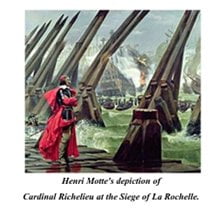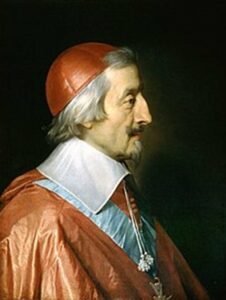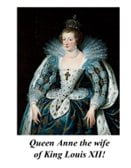 Everybody has heard of The Three Musketeers, we’ve either read the book, seen the film, or watched the television series. Now in all these the Cardinal is made out as the baddie, but was he?
Everybody has heard of The Three Musketeers, we’ve either read the book, seen the film, or watched the television series. Now in all these the Cardinal is made out as the baddie, but was he?
When you start looking into the history, I don’t think Cardinal Richelieu was that bad, in fact, he was an interesting man. Such as this picture of him at the Siege of La Rochelle, which in the end he won.
Yes, he was a hard man, who had lifted himself all the way up to the top of the French Government.
His climb started when he was consecrated as the Bishop of Luçon. This was only because his grasping parents wanted to get the income that came from a bishopric. It was also because his two elder brothers didn’t want to become bishops! Therefore, when he was only 20 his parents petitioned King Henry VI, who agreed for him to become the Bishop of Luçon. There was a problem, he was too young, so he was sent to Rome to get a dispensation from the Pope. The result was that he was finally consecrated as a bishop at the age of 21 in 1607, yes that early!
It was at this early age his brilliance appeared, and how he got known, as he had decided to be a reforming Bishop. This, of course, is what brought him to the notice of those at the top.
 As a result by the time he was 31, he became the Foreign Secretary of France. His rise to the top then continued, the church made him a cardinal in 1622 and two years later King Louis XIII of France made him the chief minister of France. A position he held until his death twenty years later.
As a result by the time he was 31, he became the Foreign Secretary of France. His rise to the top then continued, the church made him a cardinal in 1622 and two years later King Louis XIII of France made him the chief minister of France. A position he held until his death twenty years later.
He was a great believer in the power of the royalty and therefore was continuously trying to reduce the power of the nobility. He wanted to change France into a centralised state, which he partially did. His real successes, however, came in the world of foreign affairs.
At that time there was a battle going on between the Habsburg kingdoms of Spain and Austria, called the Catholic kingdoms, which meant that he had to create friendships with Protestant states like England and the Netherlands to achieve his goals of controlling France from the centre.
Now, let’s come back to “The 3 Musketeers” and how it’s author, Alexandra Dumas, used these things to weave the plot for a bestselling novel. He used Richelieu’s known opposition to Queen Anne, the King’s wife. She was the Queen, but she was also the daughter of the King of Spain and she had kept her links to Spain. History tells us that this was an annoyance to the Cardinal, allowing Alexandre Dumas to use this as the basis for his plot.
To increase the power of France, the cardinal reduced the power of the nobility, especially in 1626 when he abolished the post of Constable of France. This damaged his relations with the nobility even further. This led to a series of threats on his life, therefore the king was persuaded that Richelieu needed his own troop, The Cardinal’s Guards.
Again, history helped Dumas with his plot. It was a short leap to come up with the idea of a dispute between the Cardinal’s Guards and the Musketeers. As the Musketeers were the King’s guards while the Cardinal’s Guards reported to the Cardinal, it was a situation that Dumas could exploit. Actually, history doesn’t tell us there was any conflict between these two company’s but there could have been, it is human nature after all.
 Now Dumas had a dispute between the Musketeers and the Cardinal’s guards, another dispute between the Queen and the Cardinal. History kept giving him more to add into his story. There was a rumour that the Queen had a soft spot for the Duke of Richmond, the first minister of England. It completed the plot!
Now Dumas had a dispute between the Musketeers and the Cardinal’s guards, another dispute between the Queen and the Cardinal. History kept giving him more to add into his story. There was a rumour that the Queen had a soft spot for the Duke of Richmond, the first minister of England. It completed the plot!
Therefore, Dumas and The Three Musketeers, which is fiction, have damned Cardinal Richelieu, in the eyes of history, as a bad man.
You see there is nothing in history to tells us that Cardinal Richelieu was as bad as Dumas made him out to be. For this reason, I feel that the poor man was wronged, simply to write a good book, even if it is one that became a best seller.

Our sister site Educational Musicals has published a fun end of term musical, The Three Musketeers – The Queen’s Diamonds.
Just click on The Three Musketeers – The Queen’s Diamonds and you can read two pages of script and hear two songs from the show. Then, you can download it immediately, along with everything you need to perform it, and you will have no delay on starting rehearsals.
Isn’t history fun?
10 questions to discuss:
- How did Cardinal Richelieu initially rise to prominence within the French government?
- What position did Cardinal Richelieu hold in France at the time of his death?
- What were some of Cardinal Richelieu’s beliefs regarding the structure of the French state?
- How did Cardinal Richelieu navigate France’s relationships with other European powers, particularly in light of conflicts between Catholic and Protestant states?
- How did Alexandre Dumas use historical events and Richelieu’s opposition to Queen Anne to craft the plot of “The Three Musketeers”?
- What action did Cardinal Richelieu take to reduce the power of the nobility in France, and what were the consequences of this action?
- How did Dumas incorporate the conflict between the Musketeers and the Cardinal’s Guards into his novel, despite historical evidence to the contrary?
- What historical rumors did Dumas utilize to further develop the plot of “The Three Musketeers”?
- Why does the author of the text feel that Cardinal Richelieu was misrepresented as a villain in “The Three Musketeers”?
- In what ways does the author argue that Cardinal Richelieu was unjustly portrayed in fiction compared to his historical actions and character?
To learn more about him:
https://www.newadvent.org/cathen/13047a.htm
https://www.britannica.com/biography/Armand-Jean-du-Plessis-cardinal-et-duc-de-Richelieu
© Tony Dalton

